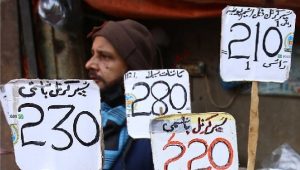10-02-2023
By SJA Jafri + Bureau Report
 ISLAMABAD/ KARACHI: Pakistan is holding last-ditch talks with the International Monetary Fund (IMF) to secure help to stem a deepening economic crisis that has all but emptied its foreign exchange reserves.
ISLAMABAD/ KARACHI: Pakistan is holding last-ditch talks with the International Monetary Fund (IMF) to secure help to stem a deepening economic crisis that has all but emptied its foreign exchange reserves.
It has enough dollars to cover less than a month of imports at normal levels and is struggling to service sky-high levels of foreign debt.
An IMF team is due to leave the country on Thursday after 10 days of talks with the government aimed at unlocking vital international funds.
In January annual inflation soared to over 27%, the highest it’s been in Pakistan since 1975, and there are mounting fears for the economy in a pivotal election year.
This week the rupee sank to a historic low of 275 to the dollar, down from 175 a year ago, making it more expensive for Pakistan to buy and pay for things.
The lack of foreign currency is one of the most pressing of Pakistan’s problems.
Factories like Jubilee Textiles in Faisalabad, the industrial heartland of Pakistan, were shut recently – not by the frequent power cuts that have dogged Pakistan for years, but because they couldn’t get hold of dollars to pay for the goods they need.
 “If we can’t import, how can we manufacture? We’ve already made a loss,” its manager Fahim told media, adding that all its 300 workers had been sent home.
“If we can’t import, how can we manufacture? We’ve already made a loss,” its manager Fahim told media, adding that all its 300 workers had been sent home.
Jubilee’s printing machines have only just restarted after shutting last month. Piles of white cotton sheets sat in iron tubs, covered by a light coat of brick dust, when a journalist visited, with the only sound the drip, drip of an industrial washer.
Walking through the network of frozen machines, Fahim said the factory had run out of the dyes they import from China, not because they weren’t available, but because they say their bank wouldn’t clear the dollars to pay for them for weeks.
According to analysts, the government had been holding the bank’s exchange rate artificially high behind the scenes which was contributing to the lack of dollars in the system. At the end of last month, they allowed it to drop, which could help some businesses, but also push prices up.
Businesses and industries across Pakistan said they have had to slow or stop work while they also wait for goods they have imported that are currently stacking up in ports.
 In late January, a government minister told media that there were more than 8,000 containers piled up in Karachi’s two ports, containing goods from medicine to food. Some of that has started to clear, according to local media reports, but much is still stuck.
In late January, a government minister told media that there were more than 8,000 containers piled up in Karachi’s two ports, containing goods from medicine to food. Some of that has started to clear, according to local media reports, but much is still stuck.
A perfect storm of problems
Pakistan, like many countries, is suffering as a result of the coronavirus pandemic and Russia’s invasion of Ukraine, following which global fuel prices have soared. Pakistan relies heavily on imported fossil fuels and importing food has also become more expensive.
If the rupee depreciates, fuel costs more, with knock-on effects for goods that are transported or manufactured. The government recently increased fuel prices by over 13% but says it’s not planning any more.
Add to this the cost of last year’s floods, which the UN says caused damage of more than $16 billion. Huge areas of Pakistan were submerged, destroying farmland and disrupting its ability to produce food. Basics like wheat and onions have skyrocketed in price.
 Pressmediaofindia
Pressmediaofindia




